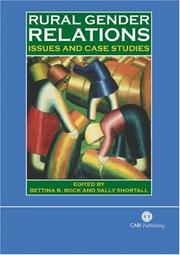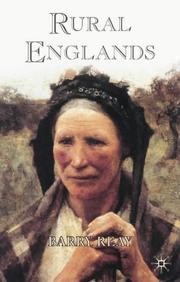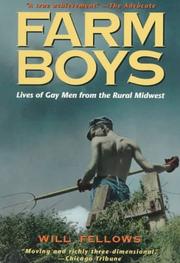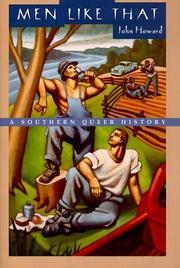| Listing 1 - 9 of 9 |
Sort by
|
Book
ISBN: 1003063268 1351153226 1281766089 9786611766085 0754690849 Year: 2008 Publisher: Aldershot, England ; Burlington, VT : Ashgate,
Abstract | Keywords | Export | Availability | Bookmark
 Loading...
Loading...Choose an application
- Reference Manager
- EndNote
- RefWorks (Direct export to RefWorks)
Using contemporary gender theory to examine gender and rurality beyond that of simply women/femininities, this illuminating book accurately locates the subject of masculinities within the rural/agricultural context. It will speak to academics in social sciences, gender studies as well as management and organization studies.
Rural men --- Men --- Masculinity --- Sex role --- Psychology

ISBN: 0851990304 0851990304 9780851990309 9780851990309 Year: 2006 Publisher: Wallingford, UK: CABI Publishing,
Abstract | Keywords | Export | Availability | Bookmark
 Loading...
Loading...Choose an application
- Reference Manager
- EndNote
- RefWorks (Direct export to RefWorks)
Rural women. --- Rural men. --- Man-woman relationships. --- Women in rural development. --- Sex role. --- Rural development.

ISBN: 0333669193 0333669185 Year: 2004 Publisher: Houndmills : Palgrave Macmillan,
Abstract | Keywords | Export | Availability | Bookmark
 Loading...
Loading...Choose an application
- Reference Manager
- EndNote
- RefWorks (Direct export to RefWorks)
Agricultural laborers --- Rural children --- Rural industries --- Rural men --- Rural women --- Working class --- History --- Employment
Book
ISBN: 9781439909980 9781439909973 Year: 2013 Publisher: Philadelphia : Temple University Press,
Abstract | Keywords | Export | Availability | Bookmark
 Loading...
Loading...Choose an application
- Reference Manager
- EndNote
- RefWorks (Direct export to RefWorks)
"Most studies of lesbian and gay history focus on urban environments. Yet gender and sexual diversity were anything but rare in nonmetropolitan areas in the first half of the twentieth century. Just Queer Folks explores the seldom-discussed history of same-sex intimacy and gender nonconformity in rural and small-town America during a period when the now familiar concepts of heterosexuality and homosexuality were only just beginning to take shape. Eschewing the notion that identity is always the best measure of what can be known about gender and sexuality, Colin R. Johnson argues instead for a queer historicist approach. In so doing, he uncovers a startlingly unruly rural past in which small-town eccentrics, "mannish" farm women, and cross-dressing Civilian Conservation Corps enrolees were often just queer folks so far as their neighbours were concerned. Written with wit and verve, Just Queer Folks upsets a whole host of contemporary commonplaces, including the notion that queer history is always urban history." --
Rural gay men --- Rural lesbians --- Rural men --- Rural women --- Homosexuality --- Country life --- Sexual behavior --- Sexual behavior

ISBN: 1282622838 9786612622830 0299150836 9780299150839 0299150844 9780299150846 0299150895 Year: 1998 Publisher: Madison, Wis. : University of Wisconsin Press,
Abstract | Keywords | Export | Availability | Bookmark
 Loading...
Loading...Choose an application
- Reference Manager
- EndNote
- RefWorks (Direct export to RefWorks)
Homosexuality is often seen as a purely urban experience, far removed from rural and small-town life. Farm Boys undermines that cliché by telling the stories of more than three dozen gay men, ranging in age from 24 to 84, who grew up in farm families in the midwestern United States. Whether painful, funny, or matter-of-fact, these plain-spoken accounts will move and educate any reader, gay or not, from farm or city.
Farmers --- Rural gay men --- Gay men --- Rural men --- Farm operators --- Operators, Farm --- Planters (Persons) --- Agriculturists --- Rural population
Book
ISBN: 9783906803029 3906803023 Year: 2016 Publisher: Zürich Edition Frey
Abstract | Keywords | Export | Availability | Bookmark
 Loading...
Loading...Choose an application
- Reference Manager
- EndNote
- RefWorks (Direct export to RefWorks)
Maximilian Stejskal (1906-1991), ethnologue et professeur de gymnastique d'Helsinki, a réalisé une étude pour sa thèse de doctorat sur les concours «d'athlétisme populaire» parmi la population rurale masculine suédophone de Finlande au début du XXe siècle. Pour son étude, Stejskal a parcouru de grandes étendues du sud et de l'est de la Finlande ainsi que de l'Estonie pendant un mois ou deux chaque année de 1929 à 1937, puis à nouveau en 1948, équipé de deux caméras à soufflet et d'une boîte de plaques photographiques en verre. Lors de ces excursions, il a systématiquement collecté des informations sur les jeux traditionnels, ou «athlétisme folklorique» comme il les appelle, qui n'étaient pratiquement plus pratiqués à l'époque. Pour la plupart, des agriculteurs et des artisans âgés lui parleraient en détail des exercices et des tests de force et de courage avec lesquels ils avaient essayé de prouver leur virilité dans leur jeunesse. Selon ces descriptions, il a été demandé à leurs fils, à leurs proches et aux travailleurs de la ferme d'effectuer les exercices devant l'appareil photo afin que Stejskal puisse les photographier. Au cours de ses recherches sur le terrain, qui ont duré plus de 20 ans, Stejskal a amassé une importante collection de documentation, qu'il a divisée en 11 sections différentes, une pour chaque excursion. Il comprend plus de deux mille pages manuscrites de carnets de voyage, des descriptions d'exercices, des tableaux, des croquis, des enregistrements musicaux et phonétiques et 433 photographies. Ce livre se concentre sur une petite sélection de ces photographies. Avec des textes de Maximilian Stejskal, Marie-Isabel Vogel et Alain Rappaport en anglais et suédois. Marie-Isabel Vogel et Alain Rappaport sont des artistes et scénographes basés à Zurich.
fotografie --- twintigste eeuw --- documentaire fotografie --- sport --- sociologie --- folklore --- Zweden --- Stejskal Maximiljan --- 77.071 STEJSKAL --- Finns --- Finland-Swedes --- Rural men --- Outdoor life --- Gymnastics --- Sports --- Folklore --- Physical education teachers --- Folklorists --- Sport --- Ethnographie --- Photographie --- Games --- Social life and customs --- History --- Stejskal, Maximilian, --- Stejskal,Maximilian --- Finlande --- Art populaire --- Finns - Sports - Finland - Pictorial works --- Finns - Games - Finland - Pictorial works --- Finland-Swedes - Social life and customs - Pictorial works --- Rural men - Finland - Social life and customs - 20th century --- Outdoor life - Finland - History - 20th century --- Gymnastics - Finland - History - 20th century - Pictorial works --- Sports - Finland - History - 20th century - Pictorial works --- Folklore - Finland - History - 20th century --- Rural men - Finland - Folklore --- Physical education teachers - Finland - Biography --- Folklorists - Finland - Biography --- Stejskal, Maximilian, - 1906-1991

ISBN: 0226354709 9780226354705 0226354717 Year: 1999 Publisher: Chicago University of Chicago Press
Abstract | Keywords | Export | Availability | Bookmark
 Loading...
Loading...Choose an application
- Reference Manager
- EndNote
- RefWorks (Direct export to RefWorks)
#VCV monografie 2003 --- Gay men --- Homosexuals --- 20th century --- Afro-American people --- History --- United States --- Mississippi --- African American gays --- Gays in popular culture --- Rural gay men --- Gays, Male --- Homosexuals, Male --- Male gays --- Urnings --- Gays --- Men --- Rural men --- Popular culture --- Afro-American gays --- Afro-American homosexuals --- Gays, African American --- Male homosexuals
Book
ISBN: 0814790933 0814773079 9780814737194 9780814737187 0814737196 0814737188 9780814773079 Year: 2010 Publisher: New York : New York University Press,
Abstract | Keywords | Export | Availability | Bookmark
 Loading...
Loading...Choose an application
- Reference Manager
- EndNote
- RefWorks (Direct export to RefWorks)
The metropolis has been the near exclusive focus of queer scholars and queer cultures in America. Asking us to look beyond the cities on the coasts, Scott Herring draws a new map, tracking how rural queers have responded to this myopic mindset. Interweaving a wide range of disciplines—art, media, literature, performance, and fashion studies—he develops an extended critique of how metronormativity saturates LGBTQ politics, artwork, and criticism. To counter this ideal, he offers a vibrant theory of queer anti-urbanism that refuses to dismiss the rural as a cultural backwater.Impassioned and provocative, Another Country expands the possibilities of queer studies beyond its city limits. Herring leads his readers from faeries in the rural Midwest to photographs of white supremacists in the deep South, from Roland Barthes’s obsession with Parisian fashion to a graphic memoir by Alison Bechdel set in the Appalachian Mountains, and from cubist paintings in Lancaster County to lesbian separatist communes on the northern California coast. The result is an entirely original account of how queer studies can—and should—get to another country.
Rural gay men --- Rural lesbians --- Gay men --- Rural men --- Lesbians --- Rural women --- America. --- Asking. --- Herring. --- Interweaving. --- LGBTQ. --- Scott. --- art. --- artwork. --- been. --- beyond. --- cities. --- coasts. --- criticism. --- critique. --- cultures. --- develops. --- disciplines. --- draws. --- exclusive. --- extended. --- fashion. --- focus. --- have. --- literature. --- look. --- map. --- media. --- metronormativity. --- metropolis. --- mindset. --- myopic. --- near. --- performance. --- politics. --- queer. --- queers. --- range. --- responded. --- rural. --- saturates. --- scholars. --- studies. --- this. --- tracking. --- wide. --- Homosexuels masculins en milieu rural --- Lesbiennes en milieu rural
Book
ISBN: 1479890898 9781479890897 9781479830770 1479830771 9781479880584 1479880582 Year: 2016 Publisher: New York, NY
Abstract | Keywords | Export | Availability | Bookmark
 Loading...
Loading...Choose an application
- Reference Manager
- EndNote
- RefWorks (Direct export to RefWorks)
Choice Outstanding Academic Title of 2016Rural queer experience is often hidden or ignored, and presumed to be alienating, lacking, and incomplete without connections to a gay culture that exists in an urban elsewhere. Queering the Countryside offers the first comprehensive look at queer desires found in rural America from a genuinely multi-disciplinary perspective. This collection of original essays confronts the assumption that queer desires depend upon urban life for meaning.By considering rural queer life, the contributors challenge readers to explore queer experiences in ways that give greater context and texture to modern practices of identity formation. The book’s focus on understudied rural spaces throws into relief the overemphasis of urban locations and structures in the current political and theoretical work on queer sexualities and genders. Queering the Countryside highlights the need to rethink notions of “the closet” and “coming out” and the characterizations of non-urban sexualities and genders as “isolated” and in need of “outreach.” Contributors focus on a range of topics—some obvious, some delightfully unexpected—from the legacy of Matthew Shepard, to how heterosexuality is reproduced at the 4-H Club, to a look at sexual encounters at a truck stop, to a queer reading of TheWizard of Oz.A journey into an unexplored slice of life in rural America, Queering the Countryside offers a unique perspective on queer experience in the modern United States and Canada.
Estudios de genero --- Mujeres --- Homosexualidad --- Transexualismo --- Vida rural --- Sexualidad --- Aspecto social --- Rural gay men. --- Rural lesbians. --- Country life. --- Sociology, Rural. --- Homosexuality --- Study and teaching. --- Sexual and Gender Minorities. --- Rural Population. --- Rural Health. --- Sexual minorities. --- Gender minorities --- GLBT people --- GLBTQ people --- Lesbigay people --- LBG people --- LGBT people --- LGBTQ people --- Non-heterosexual people --- Non-heterosexuals --- Sexual dissidents --- Minorities --- Hygiene, Rural --- Rural public health --- Environmental health --- Health --- Public health --- Medicine, Rural --- Rural Communities --- Rural Spatial Distribution --- Rural Residence --- Communities, Rural --- Community, Rural --- Distribution, Rural Spatial --- Distributions, Rural Spatial --- Population, Rural --- Populations, Rural --- Residence, Rural --- Rural Community --- Rural Populations --- Rural Residences --- Rural Spatial Distributions --- Bisexuals --- GLBT Persons --- GLBTQ Persons --- Gender Minorities --- Homosexuals --- LBG Persons --- LGBT Persons --- LGBTQ Persons --- Lesbians --- Lesbigay Persons --- Men Who Have Sex With Men --- Non-Heterosexual Persons --- Non-Heterosexuals --- Queers --- Sexual Dissidents --- Sexual Minorities --- Women Who Have Sex With Women --- Gays --- Bisexual --- Dissident, Sexual --- Dissidents, Sexual --- GLBT Person --- GLBTQ Person --- Gay --- Gender Minority --- Homosexual --- LBG Person --- LGBT Person --- LGBTQ Person --- Lesbian --- Lesbigay Person --- Minorities, Gender --- Minorities, Sexual --- Minority, Gender --- Minority, Sexual --- Non Heterosexual Persons --- Non Heterosexuals --- Non-Heterosexual --- Non-Heterosexual Person --- Person, GLBT --- Person, GLBTQ --- Person, LBG --- Person, LGBT --- Person, LGBTQ --- Person, Lesbigay --- Person, Non-Heterosexual --- Persons, GLBT --- Persons, GLBTQ --- Persons, LBG --- Persons, LGBT --- Persons, LGBTQ --- Persons, Lesbigay --- Queer --- Sexual Dissident --- Sexual Minority --- Bisexuality --- Homosexuality, Male --- Homosexuality, Female --- Gay men --- Rural men
| Listing 1 - 9 of 9 |
Sort by
|

 Search
Search Feedback
Feedback About UniCat
About UniCat  Help
Help News
News